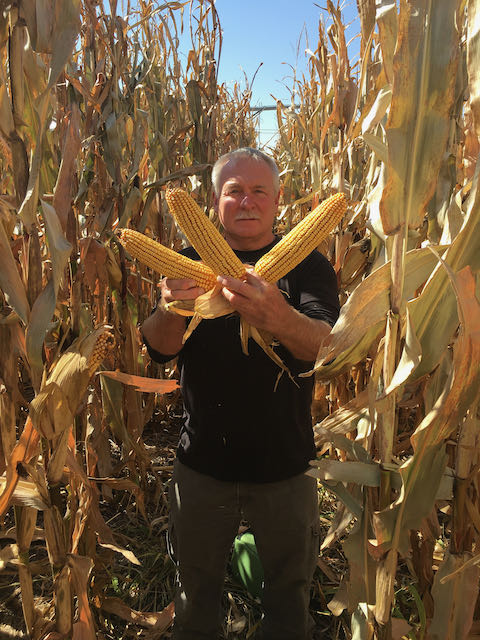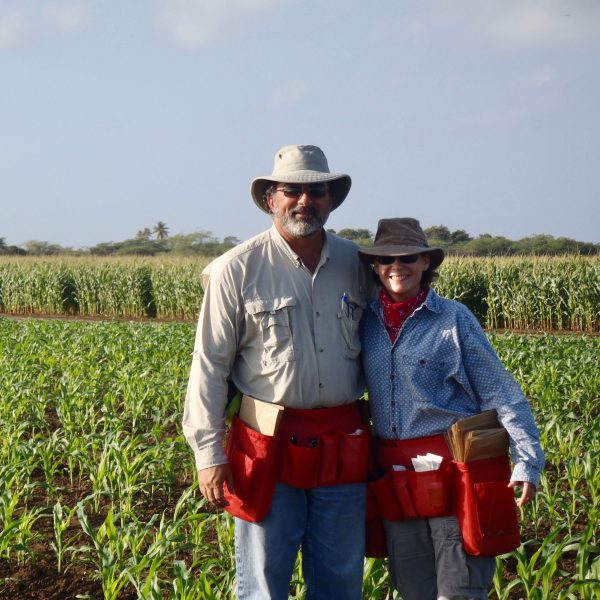In the search for crops that are resilient, high-yielding, and sustainable, Ed Baumgartner, president of BASS Hybrids, has uncovered a niche growing non-genetically modified corn seed. In the tricky, pandemic-impacted terrain of agriculture, his solution is promising. His seeds have even found a fruitful home in Kazakhstan—where farmers use the nutritious crops to feed a growing cattle industry.
BASS Hybrids, headquartered in Danube, MN, produces and sells quality non-GMO corn seed across the U.S. Corn Belt. The 2022 lineup includes 30 hybrids, the largest yet—with varieties featuring high yields and stress tolerance. Customers are finding that the transition from GMO corn to non-GMO has been worth the effort.
Founded on “farming, not chemistry,” BASS Hybrids represents four generations of accumulated knowledge and experience in seed production, sales, and plant breeding. Armed with a degree in agronomy, Baumgartner worked as a plant breeder with Olivia, MN seed company Keltgen Seed before spending seven years at Dow AgroSciences’ Puerto Rico facility. He launched 3rd Millennium Genetics in PR in 2005, as a contract service business growing seeds for other seed companies. He also began his own corn breeding program there, and in 2016 he launched BASS Hybrids to sell the non-GMO hybrids he had developed. BASS Hybrids offers high-quality seeds to farmers, with the goal of creating “legacy seeds” that will continue to support the farm over time.
Carving a new path with non-GMO
A stint in Dow’s Indiana corporate office had solidified Baumgartner’s real desire—to take his expertise in corn genetics further and launch his own firm. He noticed the viable, growing market in the U.S. for non-GMO crops. He also wanted to remain independent of large companies, to maintain freedom to control the genetic traits and move without market restrictions.
BASS Genetics develops inbreds used to make hybrids and licenses genetics to BASS Hybrids and other seed companies. Baumgartner knows that traits for drought and insect resistance are present in the corn gene pool, so there’s no need to add foreign genes. Proprietary breeding methodologies identify and collect these genes into the company’s germplasm base.
Along with natural insect and drought tolerance, BASS hybrids generate more efficient use of water and nutrients; stronger stalks and larger root mass; and flexible plant populations to achieve maximum yield. Yields up to 300+ bushels have been recorded. Reduced seed cost and strong yields are benefits to farmers transitioning to non-GMO.
The slow, patient journey of breeding hybrids
Raechel Baumgartner, Ed’s daughter and inventory manager at BASS Hybrids, said most of the retail sales are in the Dakotas, moving into Minnesota. “We develop and test 4,000 brand new hybrids every year across 5 Midwestern states, and less than 10% of them get advanced each year. Originally, we tried to focus on fringe areas, where it’s tough to grow corn. We wanted to raise yields in low-yielding areas.”

BASS Hybrids’ employee Mark Parkinson holds corn hybrids produced from the company’s corn seed.
The company has occupied the Danube facility since 2019, with 6 full-time employees. “Many of our customers are livestock farmers—our genetics are well suited for silage and feed. All of our breeding and testing programs are strictly non-GMO; we do our own bagging and seed treatments in-house. We have on-site agronomists who provide agronomic support to farmers who are converting to our non-GMO products.”
On the BASS Hybrids website, each product is given a name (“Lola,” “Francesca,” “Madeline”) instead of merely a code number; each has its own video displaying its characteristics, with close-ups and comparisons to the other hybrids.
Kazakhstan by way of Puerto Rico, through North Dakota
Today, Ed spends a lot of time in Kazakhstan. “He is part of a joint venture called Kazseeds,” Raechel said. “BASS Genetics germplasm is licensed to Kazseeds, and BASS Hybrids currently provides the bagging services. Ed sells seed for them, often marketing to very dry, short-season areas where corn is not typically grown.”
How did the connection begin? “Two brothers from North Dakota, now customers of BASS Hybrids, grew our corn in Puerto Rico to feed a livestock operation there. They also had a farming operation in Kazakhstan. They had previously transported their cattle overseas and suggested bringing over the high-quality corn seed. In 2017, two pallets of seed made the journey, and it’s grown from there.”
Kazakhstan, with a history of famine and starvation, has a lot of land but not much farming. Growing beef to sell to booming markets in Russia and China is one of the ways the country is trying to increase agriculture and gain food security. Kazseeds is playing a key role in educating and modeling successful farming.
Navigating the present and future
Raechel says this year and last have actually been good ones for business. “Despite the gut-wrenching experience of watching farmers deal with drought, it has been gratifying to see our farmers succeed, to recognize that’s why we have spent so much time and energy breeding for resilience to drought conditions,” she added.
Biggest challenge going forward? Rapid growth, said Raechel. What’s the best reward to date? “Getting calls from customers who didn’t think they were even going to have a crop due to weather…their neighbors often saw empty fields. But they did have a crop, because their fields lasted long enough to make it to the day when it rained.”





